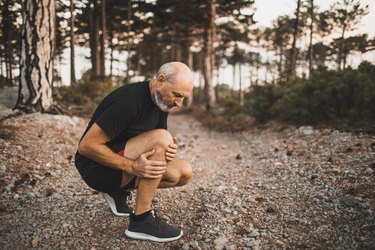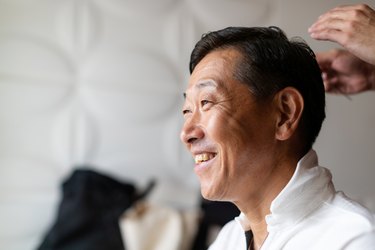
Anyone can bruise from a hard blow, bump or fall. But as we get older, those blotches can start to show up more easily.
Bruises develop when the impact from an injury causes small blood vessels near the skin's surface, called capillaries, to break. The broken capillaries cause bleeding under the skin, which shows up as a bruise, according to the Mayo Clinic. The bruise fades as the blood from the broken capillaries gets reabsorbed into the body — a process that typically takes a week or two.
Video of the Day
Video of the Day
Here's a look at why bruises become more common with age, plus what you can do to keep the bumps at bay.
Why Do Older People Bruise More Easily?
Older adults have physiological differences that make them more prone to bruising, but lifestyle factors can play a role too.
1. Skin Changes
Production of the protein collagen slows as we age. The body also loses some of the protective fat that sits under the skin and acts as a cushion. This causes skin to become thinner and more fragile, making it more prone to bruising, explains Sharon Allison-Ottey, MD, a geriatrician and member of the HealthyWomen Women's Health Advisory Council.
Increased bruising is particularly common on the hands, arms, face and legs.
2. Medications and Supplements
Certain medications and supplements can make people more susceptible to bruising too. According to the Mayo Clinic, these include:
- Aspirin
- Naproxen sodium
- Ibuprofen
- Anticoagulants (blood thinners) like warfarin and heparin
- Anti-platelet agents
- Some antibiotics and antidepressants
Fish oil, gingko biloba and St. John's wort are also common culprits, Dr. Allison-Ottey notes.
3. Poor Diet
It's more common for older adults to fall short on the vitamins and minerals they need, which can affect skin health.
"Persons with poor nutrition and imbalanced diets can bruise more easily," says Dr. Allison-Ottey.
Vitamin C deficiency, in particular, can increase the risk for internal bleeding and impaired wound healing, per Merck Manuals. It can also lead to depression and fatigue.
4. Smoking
Older adults who smoke are more prone to easy bruising compared to those who don't, says Dr. Allison-Ottey.
The chemicals in tobacco can cause blood vessels to become less stable, per January 2019 findings in Thrombosis and Haemostasis. This can make the vessels more likely to break and bleed in response to minor injuries.
5. UV Light Exposure
Up to 30 percent of adults 75 and older have actinic purpura, or solar purpura, according to the National Library of Medicine. This common skin condition occurs when long-term exposure to UV rays causes damage to the skin's connective tissue, making skin more prone to bruising.
Actinic purpura is harmless, but it can cause a person to have blotchy purple spots on their skin, especially on the backs of their hands, neck, face or forearms, the National Library of Medicine notes.
How to Prevent Bruising in Older Adults
There are two important parts to lowering bruising risk as we age. The first involves finding ways to avoid injuries in the first place. The second is about taking steps to support the health of your skin and blood vessels, so bruises are less likely to form if you do get hurt.
1. Reduce Your Fall Risk
Older adults are more prone to tripping and falling, which can result in bruises, Dr. Allison-Ottey notes. You can prevent falls by:
- Standing up from sitting slowly, so you don't get dizzy
- Reviewing medications that could cause dizziness or sleepiness with your health care provider and making adjustments as needed
- Wearing sturdy shoes that support your feet and provide proper grip — non-skid, rubber-soled, low-heeled shoes are best, per the National Institute on Aging (NIA)
- Using an assistive device like a cane or walker if you feel unsteady
2. Make Your Home Environment Safe
Hazards around your living space can set you up for tripping or falling.
"Avoid clutter and furniture with sharp edges that could lead to bumps and bruises," Dr. Allison-Ottey recommends.
You can also install grab bars in the bathroom and make sure there are handrails and lights at each staircase, per the Centers for Disease Control and Prevention (CDC).
3. Be Active and Prioritize Balance Exercises
Regular physical activity makes you stronger, and balance exercises in particular can keep you steadier on your feet, the CDC notes.
Aim to get at least 150 minutes of moderate exercise (like walking or swimming) per week and make it a habit to perform balance-improving exercises.
4. Wear Sunscreen
Wearing SPF 30 or higher daily and practicing smart sun habits can protect your skin from further UV damage, Dr. Allison-Ottey notes.
5. Eat a Healthy Diet
Eating a well-rounded diet, especially vitamin-C rich fruits and vegetables, can help your skin and blood vessels function at their best.
When to Worry About Bruises in Older Adults
Minor bruising isn't typically cause for concern if you know how the bruise happened (like from falling or bumping into something). But you should talk with your doctor if you're bruising for no reason or you notice you're starting to bruise much more easily, recommends Dr. Allison-Ottey. These could potentially be signs of a blood disorder or certain cancers.
In rare instances, unexplained bruising could be a sign of elderly abuse, especially if it occurs alongside other unexplained injuries (i.e. burns, scars) or a sudden change in behavior (depressed, confused, withdrawn), per the NIA.
If you suspect an older adult is the victim of elderly abuse, get help. You can find out where and how to report abuse in older adults at ncea.acl.gov.
- Mayo Clinic: "Easy bruising: Why does it happen?"
- Merck Manuals: "Vitamin C Deficiency"
- Thrombosis and Haemostasis: "Smoking is Associated with Increased Risk of Major Bleeding: A Prospective Cohort Study"
- National Library of Medicine: "Actinic Purpura"
- National Institute on Aging: "Prevent Falls and Fractures"
- Centers for Disease Control and Prevention: "Keep on Your Feet—Preventing Older Adult Falls"
- National Institute on Aging: "Elder Abuse"
Is this an emergency? If you are experiencing serious medical symptoms, please see the National Library of Medicine’s list of signs you need emergency medical attention or call 911.


